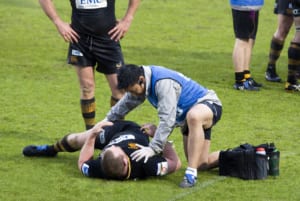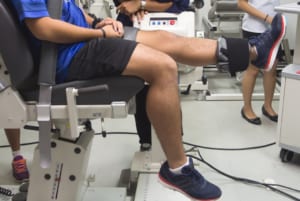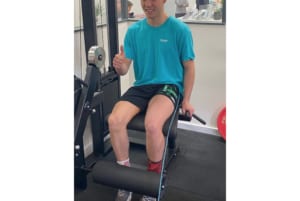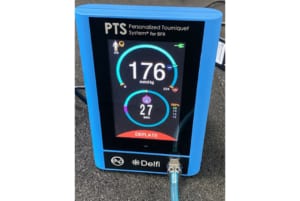What is a sports physiotherapist?
What is a sports physiotherapist?
Sports physiotherapy is a speciality within physiotherapy which is dedicated to the assessment and treatment of injuries related to sports and exercise at all levels and ages. Whether the sport is running the London marathon, playing football for Manchester United or climbing Everest, each injury has to be considered in the context of the demands of the activity. As well as getting athletes out of pain and back to full function, sports physiotherapists are also focused on the performance and development of the individual.
“The goal of sports physiotherapist it to get their clients out of pain asap but also performing at their very best.”
Sports injuries are different to normal day to day injuries. The demands of sport on the body are higher than everyday activities such as walking. This places more pressure on the joints, ligaments, muscles and tendons and can make them prone to injury.
The term ‘physiotherapist’ is a protected title in the UK. This means that the person is a Chartered Physiotherapist. Chartered physiotherapists are members of the Chartered Society of Physiotherapists (CSP) and the Health & Care Professions Council (HCPC). The public can check to see if a physiotherapist is a member of the HCPC here: https://www.hcpc-uk.org/check-the-register/.
The term ‘sports physiotherapist’ is not a protected title in the UK, unlike in Australia for example. This means that any physiotherapist in the UK can call themselves a ‘sports physiotherapist’. It is essential that if someone wants to see a sports physiotherapist that the physiotherapist has the necessary knowledge, skills and experience. This makes it very difficult for the public to be able to choose the right physiotherapist for their injury. Many do call themselves a ‘sports physiotherapist’ but do not meet the criteria we set.
‘Sports physiotherapists’ should meet the following criteria:
- Postgraduate education – Masters or PG Certificate or Diploma in ‘Sports Physiotherapy’ or ‘Sports and Exercise Medicine’
- Extensive experience (5 years+) working in professional or elite sports in a variety of settings and sports
- Evidence of regular and up-to-date attendance at a variety of educational courses relevant to their field/specialism.

Sports physiotherapists in the UK work in private practice and with sports teams and organisations.
At Complete Physio we have very experienced ‘sports physiotherapists’ who meet these criteria with ease. Alongside their work at Complete, our physiotherapists also work with the NBA, Professional Football, England Hockey and British Athletics to name a few… they have also been selected to work at the Olympics and World Championships.
What does a sports physiotherapist do?
Sports physiotherapists have a multi-faceted role which includes:
- Assessment of injuries – this requires careful and comprehensive questioning about the current injury and previous injuries and will involve a thorough examination of the body.
- Identifying the root cause of the injury – often the root cause is not where the pain is located. Thorough assessment will identify the factors that have contributed to the injury.
- Development of an individualised treatment plan – this will address all weaknesses and imbalances. We want an athlete to come back stronger from their injury to prevent re-occurrence.
- Improve the strength and mechanics of other parts of the body. This is essential especially if an athlete needs a period of time away from sport whilst they recover.
- Applying realistic timescales for their return to sport. This is a skill and only comes with experience. Injuries heal at different rates in different people.
- Working as part of a multi-disciplinary team. This may be the immediate team e.g. coach, team manager, sports doctor or parent or it may require a referral to the extended team e.g. sports psychologist or dietitian.
- Injury prevention – identifying all the modifiable risk factors to an injury and implementing a plan to address them.
Let’s look at a few elements of this in more detail;
How do sports physiotherapists assess your injury?
A sports physiotherapist will carry out a comprehensive assessment of the injured area but also will assess the whole kinetic chain involved in the specific movement pattern of the sport. For example, a footballer will be assessed differently to a runner. This will identify why the injury occurred in the first place and allow a specific treatment programme to be implemented. They will also require information about your current training programme, weekly load and important competitions you have in the near and distant future. Your treatment programme will always be specific to your individual needs and specifically with these goals in mind.
Sports physiotherapists will also use a barrage ( would variety be better?)of tests and equipment to gain objective data to set a baseline level of your current strengths and weaknesses. Injury is a very frustrating experience for athletes. Setting objective goals and targets is an excellent way of keeping athletes motivated and engaged. This is a key skill of sports physiotherapists.
Using objective data a sports physiotherapist will build a profile of the athlete. Here are a few examples of what this may include:
- Diagnostic ultrasound scan to assess and monitor injuries
- ultrasound is excellent at visualising muscles , tendon and joints, often better than MRI.
- Muscle length testing
- a comprehensive examination of your muscle length is carried out to identify any key muscle imbalances using a series of validated and reliable tests.
- Strength testing
- using specialist equipment that tests the strength of your muscle (concentric, eccentric and isometric) For example, at Complete Physio we have an isokinetic machine and use hand-held dynamometers (HHD). This will provide key strength information that we can compare to your other side or benchmark you against other athletes we treat. This will identify muscle imbalance and weaknesses that must be addressed.

Isokinetic Test – this service is provided at our Bury Street clinic (next to the Gherkin)

Handheld dynamometry is provided at all clinics
- Force plate testing
- provides immediate feedback on neuromuscular performance and asymmetries during functional tests. This is the closest analysis on the market that provides information on strength, mechanics and biomechanical asymmetries during functional tasks.
- Video Analysis
- Is used particularly with runners to assess their running style and identify any contributing technical or biomechanical factors that need to be addressed as part of the treatment programme. This is particularly important pain is experienced only during sport or activity.
This information provides a detailed insight into an athlete’s capabilities and limitations and can enhance decision making around the right rehabilitation to return to sport and/ or develop performance.
All of these are services are available at Complete Physio. If you would like to discuss these in more detail please do not hesitate to contact us.
Sports Physiotherapists have specialist knowledge and skills
How do sports physiotherapists treat your injury?
In sport, it’s all about the ‘marginal’ gains and the treatment of sports injuries is no different. Sports physiotherapists are always striving to find new treatment techniques or equipment that is going to speed up an athlete’s recovery.
A sports physiotherapist is competent in ‘hands on’ treatment and has extensive training and experience in soft tissue techniques such as myofascial release and joint techniques such as spinal manipulation. However, where they often stand out are is there injury management and rehabilitation skills. Many have studied strength and conditioning to ensure they periodise your rehabilitation and develop your athletic ability, so you come back stronger from injury. Lack of strength is often a key risk factor for many joint, tendon and muscle injuries and forms a key part of most treatment regimes and injury prevention programmes.

Sports injuries can be complicated and often a team approach is required to get an athlete back on track. This may require a review by a surgeon, a sports doctor or your GP. It is essential that all the health care professionals involved are working together and communicating effectively . The team around you is essential. At Complete Physio we have a great team and work closely with many world renowned sports doctors and surgeons to ensure you are fully informed about your injury and are presented with all the treatment options available to you.
To ensure you get back on track as quickly as possible there are certain services that can optimise your recovery. These are not required in all cases but can provide an effective adjunct to treatment. We provide all these services; If you would like to discuss these in more detail please do not hesitate to contact us.
Shockwave therapy (also known as ESWT – Extracorporeal Shockwave Therapy)
Shockwave an effective treatment modality for many tendon complaints particularly those related to running such as proximal hamstring, Achilles and plantarfascitis. We suggest you require a minimum of three sessions. This must be carried out alongside a rehabilitation programme.
Occlusion Therapy
Occlusion is used following operations or when an athlete needs to gain strength and muscle bulk (hypertrophy) in a short period of time, whilst not putting excessive weight through the joint. Most strength training occurs at 70-80% of a one rep max (1RM). However, occlusion therapy allows improvements in strength and muscle bulk at 30% of a one rep max (1RM). This means less joint compression and ultimately less pain whilst exercising but still encourages the gains required.

Isokinetic

Machine
This is an excellent way of gaining strength in a short period of time. This is used mainly for knee problems to strengthen the quadriceps and hamstrings. It can also help to restore any imbalances in the quadriceps and hamstring. The machine allows you to work one type of muscle contraction if required. For example, if you are weak eccentrically (working the muscle when the muscle is lengthening) then this phase can be isolated on the machine. This can be very useful and improved the specificity of rehabilitation.
Ultrasound guided injections
Ultrasound guided injections can be a useful adjunct to reduce pain with certain sports injuries. These should be reserved for injuries where pain is the limiting factor to participating in a rehabilitation programme. A steroid injection or a hyaluronic acid has an anti-inflammatory effect which can result in a significant reduction in pain. This can speed up the recovery process and provide a window of opportunity to engage in a rehabilitation programme,
Your treatment and recovery does not stop when you are painfree and back to sport. This biggest risk factor to injury is having the same injury as previously. The recurrence of sports injuries is high, for example, for Achilles tendon pain it is 50%. Implementing an effective prevention regime is essential for any athlete. Sports physiotherapists are also specialists in injury prevention.
The ideal situation is that we prevent injuries before they even occur. Injury prevention is a specialised area and there is a growing body of scientific evidence highlighting what causes sports injuries and what can be implemented to prevent them. This may involve load monitoring and management, lifestyle management, diet/nutrition advise and more technical analysis e.g. running re-training.
Providing education and resources to the athletes is an essential part of the treatment process. This includes ensuring that the athlete has an in depth understanding of the injury that has been sustained, why the injury occurred in the first place and the action that is necessary to ensure it does not return.
Can someone see a sports physiotherapist on the NHS?
The answer is yes. The problem is there are not many dedicated sports injury departments in the UK. In London, there is the Homerton Sports Injury Clinic and Mile End Hospital. We have good links with the teams at the departments and are always happy to make a referral if we have assessed your injury.
If you have any questions about a sports injury or would like to find out who the best ‘sports physiotherapist’ is at Complete Physio for your specific problem then please do not hesitate to contact us. For enquiries or to book an appointment please email info@complete-physio.co.uk or call us 020 7482 3875.

